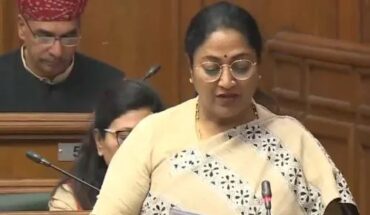Panjim: Goa went into a sudden three-day total lockdown from July 16 in a bid to curb the spiraling number of Covid-19 cases, even as experts warned of these cases peaking in the monsoons that are lashing the State. Chief Minister Pramod Sawant said the lockdown was necessary as “It has been observed that, despite efforts of the district authorities, health personnel and police, the citizens are not adhering to guidelines of social distancing and use of masks – besides there being complaints of regular parties.”

A buffalo herd placidly heads homeward after grazing, while migrants carry out local road repair works in Bastora village of North Goa.
While the lockdown ends 6 am Monday, night curfew will continue to enforced from 8 pm to 6 am upto August 10, Sawant said. While about 198 cases were registered on July 15 with 67 recoveries, Goa’s two-month-long clean slate of zero cases and deaths has suddenly snowballed into presently 2,951 Covid-19-91 positive cases with 1674 recoveries and 18 deaths due to ‘co-morbid’ conditions.
Earlier, Goa — which is in the Green Zone — had witnessed relaxation in the lockdown efforts from May 4 with Government offices, barber saloons and public transport reopening alongside movement of two-wheelers, four-wheelers, rickshaws and taxis from 7 am to 7 pm, according to Union Home Ministry guidelines.
Tipplers also had cheered as 1300 liquor shops – closed since lockdown was imposed on March 22 — reopened shutters in the State where tourism is the main industry and liquor consumption rate is around 70 percent by tourists alone, according to Dattaprasad Naik, president of All Goa Liquor Traders Association.
Goa’s tourism and leisure industry, which was rendered idle by Covid-19 for three months, recently witnessed opening of around 250 hotels which are upbeat about business despite the offseason and monsoons. However, sharp decline in revenue collection witnessed Goa borrowing Rs 900 crore to tide over a staggering 74% tourism decline due to the Covid-19 pandemic.

A popular Mario Mendes painting of a bustling marketplace stares down on an empty vegetable market affected by Covid-19 in Mapuca, Goa
However, when India approached the end of the third lockdown in early May, Goa’s brave anti-Corona efforts were ruined by the discovery of seven positive Covid-19 cases in Ponda taluka – highlighting the fact that no state can rest without enforcing strict social distancing and closing porous borders. This happened when a family of six from Mumbai and two truck drivers from Gujarat were earlier found Covid-19 positive at a Ponda hospital during a Truenet screening test. However, a second test through the Real time RT-PCR method in the Goa Medical College (GMC) on May 13 confirmed seven of them to be Covid-19 positive.
Even as the first train from Delhi was reaching Margao on May 16 with 500 passengers, Chief Minister Pramod Sawant had then said non-Goan train travelers would have to undergo compulsory 14 days home quarantine or paid quarantine, even if they test negative for Covid-19.
The migrant rush to depart for their native places in North India may not have lessened but one migrant worker from Jharkand chose to stay in Bastora, Goa. While stepping out to recharge his phone, he said he was happier working as a welder in the present situation rather than searching for work in his native place.
However, other migrants had continued to make a beeline roads and highways to bus stands and Tivim railway station to catch trains to destinations outside Goa. Strangely, many migrants registering with the Government here for travel were found to be having Goa-issued Aadhar and other official cards.
The Indian Railways has been running weekly trains from New Delhi to Goa from May 15 with halts at Kota, Vadodara, Surat, Vasai Road, Panvel, Ratnagiri, Kudal, Tivim, and Margao. About 85% ticket cost is borne by the Railways and remaining by the State Government for all 728 passengers aboard a special Shramik train from Margao here to Jammu & Kashmir and Ladakh, according to district collector Ajit Roy.
The Goa Government hiked the excise duty on liquor from May 15, while assuring strict monitoring on the train services resumption for migrant movement to other states. However, the decision to allow passenger train movement between Goa and New Delhi has drawn strong criticism from different quarters. “The train coming from a Red Zone to a Green Zone increases the danger of Covid-19 spreading in Goa, which has successfully controlled it so far while ensuring its borders are closed except for essential commodities movement,” said a senior retired official, while Porvorim MLA Rohan Khaunte questioned about set up of necessary mechanisms to check alighting passengers, besides their origin and necessity in the state.
Meanwhile, the local survivors of the three lockdowns in Goa are wearily but determinedly gearing up for facing up to further Covid-19 restrictions and all levels of industries are trying to work out means and efforts in reviving their workplaces into feasible economic activity, as even the Mom-and-Pop shops witness brisk sales despite 40 days of lockdown.
While it was partly business as usual – though with restrictions — one small-time cashewnut vendor for the past three decades in Mapusa, North Goa sadly noted that he has never witnessed such a bad period in business as over Rs 50,000 worth of cashewnuts expired past shelf life, causing him a loss in this lockdown. However, he expressed hope of bouncing back to profit as oldtime customers kept coming in with the lockdown being eased in Goa.
Echoing him was Kirtesh Belekar (33) whose tea-cum-breakfast cove earlier drew Rs 2,000 worth of profits after the consumables were over by day end. Bemoaning the loss of over Rs 70,000 due to closure in the Covid-19 lockdown, he said the easing of restrictions while maintaining social distancing had brought some hope to the economy through sales picking up briskly with even the habituated getting their much-loved “cuppa chai.”
Shekar Rathod, a 41-year-old coconut plucker from Karnataka who manages a coconut farm in Green Taleigao area, has managed to eke out a living on the streetside in the state capital Panjim as people flock to sample tender coconuts for Rs 40 each. Narrating his life story, Rathod described his journey through alcoholism and tobacco misuse before giving it up to now sell 100 coconuts daily for survival in the face of Covid-19.






